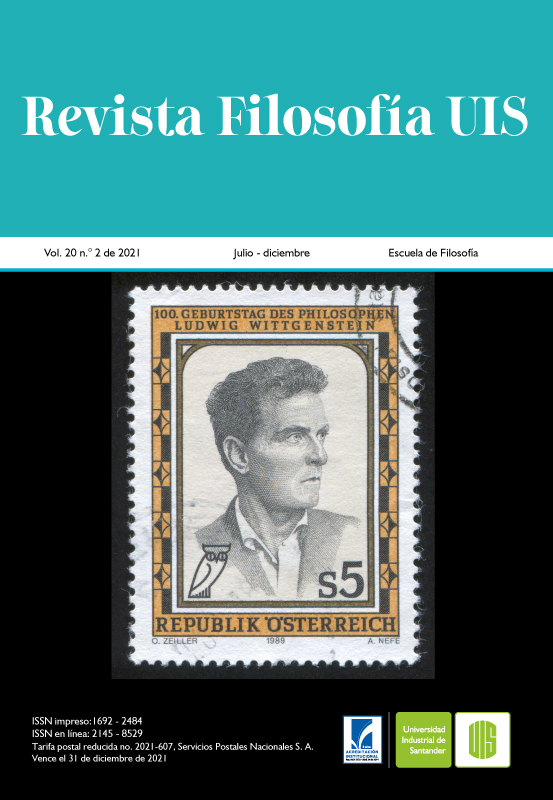The “Unboundedness of the Conceptual” and Singular Thoughts in McDowell
Published 2021-06-11
Keywords
- conceptual,
- intentionality,
- limits,
- singular,
- thoughts
How to Cite
Copyright (c) 2021 Revista Filosofía UIS

This work is licensed under a Creative Commons Attribution 4.0 International License.
Abstract
Our purpose in this paper is to reconstruct the proposal on “de re thoughts” or singular thoughts that John McDowell develops. Our strategy is to address this reconstruction on the basis of “the unboundedness of the conceptual” thesis explained in his most recent production. The contrast between some aspects in Mind and World (1994) and previous articles dedicated to the singular thought gives a concrete explanatory value to the thesis that claims that the conceptual is unbounded.
Downloads
References
- Burge, T. (1977). Belief De Re. The Journal of Philosophy, 74(6), 338-362. https://doi.org/10.2307/2025871
- Brandom, R. (2019). A Spirit of Trust: A Reading of Hegel’s Phenomenology. Harvard University Press.
- Descartes, R. (1977). Meditaciones metafísicas. Con objeciones y respuestas. (F. Vidal Peña, trad.). Alfaguara.
- Evans, G. (1982). The Varieties of Reference. Oxford Clarendon Press.
- Evans, G. (2018). Las variedades de la referencia. (E. Berumen, A. Anaya, L. Perez y otros, trads.). Universidad Autónoma Metropolitana-Universidad del Rosario.
- Fish, W. (2009). Perception, Hallucination and Illusion. Oxford University Press.
- Frege, G. (1972). Conceptografía. Los fundamentos sobre la aritmética (H. Padilla, trad.). UNAM [original publicado en 1879].
- Frege, G. (1979). Posthumous Writings. Basil Blackwell.
- Frege, G. (1994). El pensamiento. En Investigaciones Lógicas. (L. Ml. Valdés Villanueva, trad.), (pp. 49-85). Técnos. [original publicado en 1918-1919].
- Kripke, S. (1980). Naming and Necessity. Harvard University Press.
- Martin, M. G. F. (2002). The Transparency of Experience. Mind & Language, 17(4), 376-425. https://doi.org/10.1111/1468-0017.00205
- McDowell, J. (1979). Virtue and Reason. En Mind, Value and Reality (pp. 50-73). Harvard University Press.
- McDowell, J. (1994). Mind and World. Oxford University Press.
- McDowell, J. (1998). Meaning, knowledge and reality. Oxford University Press.
- McDowell, J. (2003). Mente y mundo (M. Á. Quintanilla, trad.). Ediciones Sígueme.
- McDowell, J. (2006). Having the World in View. Essays on Kant, Hegel and Sellars. Harvard University Press.
- McDowell, J. (2011). Perception as a Capacity for Knowledge. Marquette University Press.
- McDowell, J. (2018). Perceptual Experience and Empirical Rationality. Analytic Philosophy, 59(1). 89–98.
- Putnam, H. (1975). Mind, Language and Reality. Philosophical Papers Volume 2. Cambridge University Press.
- Quine, W. (1956). Quantifiers and Propositional Attitudes. The Journal of Philosophy, 53(5). 177-187. https://doi.org/10.2307/2022451
- Russell, B. (1905). On Denoting. Mind. 14 (56). 479-493. http://www.jstor.org/stable/2248381
- Russell, B. (1911). Knowledge by Acquaintance and Knowledge by Description. Proceedings of the Aristotelian Society, 11(1). 108-128. https://doi.org/10.1093/aristotelian/11.1.108
- Russell, B. (2010). Misticismo y lógica. (S. Jordán, trad.). Edhasa.
- Searle, J. (1958). Las objeciones de Russell a la teoría de Frege sobre el sentido y la denotación. En T. Moro Simpson (Ed.), Semántica Filosófica: problemas y discusiones (pp. 49-55). Siglo XXI Editores.
- Sellars, W. (1997). Empiricism and the Philosophy of Mind. Harvard University Press [publicación original de 1953].
- Smith, N. (2002). Reading McDowell. On Mind and World. Routledge.
- Thornton, T. (2004). John McDowell. McGill-Queen’s University Press.

